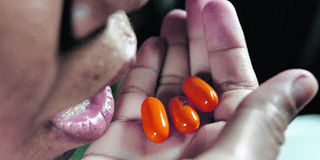Panic over scarcity of life-saving HIV drug in hospitals

A HIV patient consumes antiretroviral drugs. A life-saving drug for people living with HIV is missing in most high traffic HIV clinics in the country. FILE PHOTO
What you need to know:
- A spot-check conducted by Nation revealed that the drug is missing in most clinics.
- At Kisumu Sub- County referral hospital, HIV centre, which serves close 7,000 patients, the drug has been missing for two months.
- In Homa Bay, which is the leading county with the highest number of adults infected with HIV in the country, the drug was also out of stock.
A life-saving drug for people living with HIV is missing in most high traffic HIV clinics in the country, the Nation has learnt.
The drug, liposomal amphotericin B (L-AMB), is highly effective when used in combination with other medicines to treat cryptococcal meningitis, the second biggest killer of people living with HIV after tuberculosis.
DRUG MISSING
A spot-check conducted by Nation revealed that the drug is missing in most clinics. At Kisumu Sub- County referral hospital, HIV centre, which serves close 7,000 patients, the drug has been missing for two months now.
The drug, which is the main one used in treating cryptococcal meningitis, is normally ordered by county governments then supplied to hospitals. Supply is very scanty.
“There is a big problem. Since this is a fatal condition, it should not be out of stock even for a week but it is close to a month now. The patients need to be on the drug for two weeks,” said an employee at the HIV centre.
“This is a killer condition in HIV patients. We need to have the drug in stock. It kills very fast if left untreated,” said Dr Amos Otedo, a physician at the hospital. Since the HIV services were decentralised to lower level hospitals, most of them, including Lumumba and Kombewa hospitals, that the Nation contacted, did not have the drug in stock.
PUBLIC HOSPITALS
A study done in Kisumu County Hospital, Nairobi Rheumatology Clinic and Mater Hospital in 2017 involving 141 patients with HIV and cryptococcal meningitis revealed that, in public hospitals, amphotericin B is not regularly supplied and patients had to buy it.
The study of HIV positive Kenyan patients led by Dr Amos Otedo recommended that measures to provide the drug at mid-level hospitals must be enhanced.
In Homa Bay, which is the leading county with the highest number of adults infected with HIV in the country at 21 per cent, the drug was also out of stock. Nation could not verify for how long the drug has been out of stock at the Homa Bay referral hospital. However, according to an employee at the facility, patients have not been able to get it since last month.
“I am not sure from when the drug has been out of stock but late last month, a friend of mine was told to come back this week. I am very sure it has not yet been procured. What happens if they miss other doses?” he posed.
TREATMENT
According to Dr Otedo, a dose of the drug goes for Sh500. A patient needs a dose every day for two weeks to complete the full treatment course.
“I know the drug is very expensive but also very essential,” he said. According to the medical humanitarian organisation Médecins Sans Frontières (MSF), high prices and inaccessibility are major barriers to people accessing them. The MSF said that the problem has been caused by a monopoly by Gilead Sciences, a pharmaceutical firm that has failed to deliver on promises to make the drug available to people suffering from HIV.
Last year, Gilead announced its ‘access initiative’ promising lower prices for liposomal amphotericin B (L-AMB) in 116 developing countries, Kenya included but to date, the drug largely remains inaccessible and unavailable at an affordable price in Kenya.
This has made it very difficult for MSF to procure the drug which is given for free in their HIV clinics.
“It’s deplorable that they keep dragging their feet at the expense of people’s lives. Gilead must urgently honour their commitment to making L-AMB available for everyone who needs it, and quickly register the drug in high HIV-burden countries,” said Jessica Burry, MSF Access Campaign Pharmacist.
MENENGITIS
She adds: “L-AMB continues to be priced out of reach in many developing countries. For example, in South Africa and Kenya, the drug is priced as high as $200 per vial (at least $4,200 per full treatment course).”
In India, it is priced at $45 per vial (nearly $1,000 per full treatment course). National programmes and treatment providers are still unable to purchase the drug at the corporation’s promised price.
Cryptococcal meningitis is an infection of the brain, which if left untreated, results in an agonising death for people living with HIV.
Cryptococcal meningitis kills more than 180,000 people every year, 75 per cent of whom live in Sub-Saharan Africa. It especially affects people living with HIV whose immune systems are severely suppressed.





